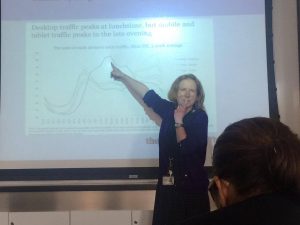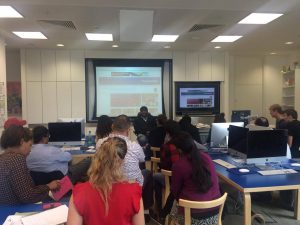As part of the Refugee Journalism Project, 15 RJP participants had the opportunity to visit the Guardian Media Group, last week, in King’s Cross, London.
After a warm welcome from Margaret Holborn, head of the Guardian Education Centre, the group learned when and how the Guardian was established. Ms Holborn gave a thorough description of the paper’s history. Some interesting facts about the newspaper’s origins are as follows:
-

Margaret Holborn illustrates peak time traffic of the Guardian.Photo by Azizrahman Omid Azizi The Guardian first published locally as The Manchester Guardian in 1821
- The paper moved to London and became the Guardian in 1959
- The Guardian Media Group (GMG) bought the Observer in 1993
- The paper launched its website in 1995
- The Guardian redesigned its layout and resized its paper in 2005
- The Guardian went digital in 2011
- The Guardian launched its next generation website in 2015
Once Ms Holborn had talked us through the historical background of the paper, she then gave an insight into GMG’s readership and online traffic. As per her description, peak desktop traffic was at lunchtime when office workers take a bite into their sandwiches and read the news at their desks. However, the peak times for mobile and tablet users were late evenings when people were heading home from the job or going to bed. The sale of the paper according to Ms. Holborn was high on Saturdays in comparison to other weekdays. The readership had more time on Saturdays to digest the longer format read.
She then moved on to the day-to-day operation of the paper and how it was run on daily basis. She explained everything from the first daily news conference, to which editor is responsible for which section, then to how the shifts are divided.
The session was informative and useful to participants who have come from different countries where the papers are run contrarily to the UK media industry.
The second speaker was journalist Gary Younge.

Having a room full of journalists, Mr. Younge talked about his background and experience in journalism from his early days as a reporter to his current position at the Guardian as the Editor-at-Large. The participants were inspired by the honesty and frankness of Mr. Younge. Responding to one of the participant’s question about how he could avoid bias in reporting, Mr. Younge frankly admitted that it was impossible to avoid biases.
“It is better to admit your biases and be aware of it,” Mr. Younge said.
He was candid and brutally honest about the situation of journalists in his paper and made no empty promises to participants, not even about any unpaid opportunities. He said that financially newspapers are in a very critical situation. He encouraged the participants to focus on technical expertise in broadcast and multimedia, as the employability chances were very higher.
At the end of Q&A, Mr. Younge asked his colleague Mr. Ben Hicks, Executive Director at the Guardian Foundation to take over.
Mr. Hicks talked about the opportunities at the Guardian Foundation and encouraged journalists to apply for the Scott Trust bursaries or the foundation’s international programmes. Mr. Hicks said that his foundation currently plans a media seminar for Women Human Rights Defenders in Brazil, and offers training to young Turkish and Syrian journalists in Istanbul. He encouraged the participants to apply or spread the word amongst fellow journalists who may qualify for these programmes.
It was a useful visit as the participants learned about the paper’s history and growth, the practical day-to-day operation, the current situation of the paper, and about possible opportunities for future employment and training.
The session ended with a promise by the RJP staff that another daylong visit would be organized at the Guardian where the participants will have the chance to meet with a number of commissioning editors as well as other journalists at the Guardian.
